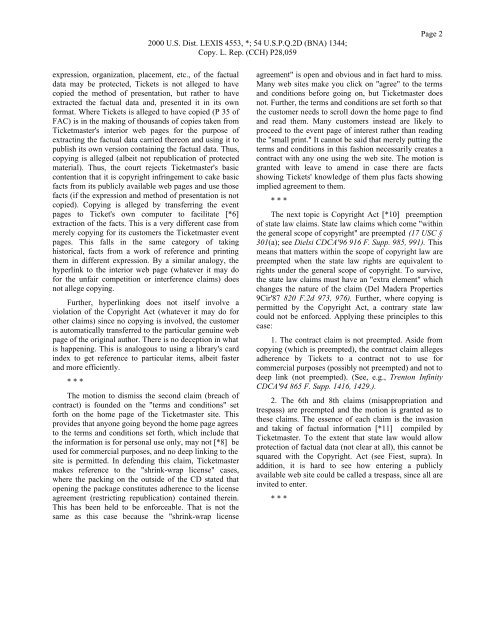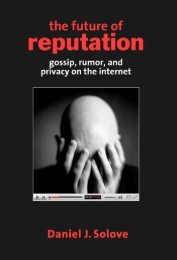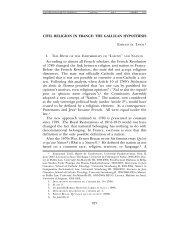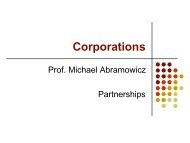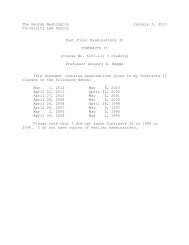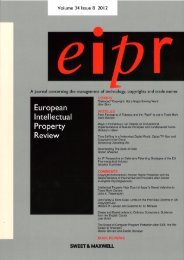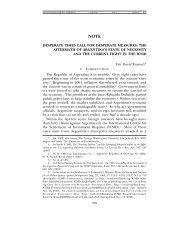TICKETMASTER CORP., et al. v. TICKETS.COM, INC - Gwu
TICKETMASTER CORP., et al. v. TICKETS.COM, INC - Gwu
TICKETMASTER CORP., et al. v. TICKETS.COM, INC - Gwu
You also want an ePaper? Increase the reach of your titles
YUMPU automatically turns print PDFs into web optimized ePapers that Google loves.
expression, organization, placement, <strong>et</strong>c., of the factu<strong>al</strong><br />
data may be protected, Tick<strong>et</strong>s is not <strong>al</strong>leged to have<br />
copied the m<strong>et</strong>hod of presentation, but rather to have<br />
extracted the factu<strong>al</strong> data and, presented it in its own<br />
format. Where Tick<strong>et</strong>s is <strong>al</strong>leged to have copied (P 35 of<br />
FAC) is in the making of thousands of copies taken from<br />
Tick<strong>et</strong>master's interior web pages for the purpose of<br />
extracting the factu<strong>al</strong> data carried thereon and using it to<br />
publish its own version containing the factu<strong>al</strong> data. Thus,<br />
copying is <strong>al</strong>leged (<strong>al</strong>beit not republication of protected<br />
materi<strong>al</strong>). Thus, the court rejects Tick<strong>et</strong>master's basic<br />
contention that it is copyright infringement to cake basic<br />
facts from its publicly available web pages and use those<br />
facts (if the expression and m<strong>et</strong>hod of presentation is not<br />
copied). Copying is <strong>al</strong>leged by transferring the event<br />
pages to Tick<strong>et</strong>'s own computer to facilitate [*6]<br />
extraction of the facts. This is a very different case from<br />
merely copying for its customers the Tick<strong>et</strong>master event<br />
pages. This f<strong>al</strong>ls in the same category of taking<br />
historic<strong>al</strong>, facts from a work of reference and printing<br />
them in different expression. By a similar an<strong>al</strong>ogy, the<br />
hyperlink to the interior web page (whatever it may do<br />
for the unfair comp<strong>et</strong>ition or interference claims) does<br />
not <strong>al</strong>lege copying.<br />
Further, hyperlinking does not itself involve a<br />
violation of the Copyright Act (whatever it may do for<br />
other claims) since no copying is involved, the customer<br />
is automatic<strong>al</strong>ly transferred to the particular genuine web<br />
page of the origin<strong>al</strong> author. There is no deception in what<br />
is happening. This is an<strong>al</strong>ogous to using a library's card<br />
index to g<strong>et</strong> reference to particular items, <strong>al</strong>beit faster<br />
and more efficiently.<br />
* * *<br />
The motion to dismiss the second claim (breach of<br />
contract) is founded on the "terms and conditions" s<strong>et</strong><br />
forth on the home page of the Tick<strong>et</strong>master site. This<br />
provides that anyone going beyond the home page agrees<br />
to the terms and conditions s<strong>et</strong> forth, which include that<br />
the information is for person<strong>al</strong> use only, may not [*8] be<br />
used for commerci<strong>al</strong> purposes, and no deep linking to the<br />
site is permitted. In defending this claim, Tick<strong>et</strong>master<br />
makes reference to the "shrink-wrap license" cases,<br />
where the packing on the outside of the CD stated that<br />
opening the package constitutes adherence to the license<br />
agreement (restricting republication) contained therein.<br />
This has been held to be enforceable. That is not the<br />
same as this case because the "shrink-wrap license<br />
2000 U.S. Dist. LEXIS 4553, *; 54 U.S.P.Q.2D (BNA) 1344;<br />
Copy. L. Rep. (CCH) P28,059<br />
Page 2<br />
agreement" is open and obvious and in fact hard to miss.<br />
Many web sites make you click on "agree" to the terms<br />
and conditions before going on, but Tick<strong>et</strong>master does<br />
not. Further, the terms and conditions are s<strong>et</strong> forth so that<br />
the customer needs to scroll down the home page to find<br />
and read them. Many customers instead are likely to<br />
proceed to the event page of interest rather than reading<br />
the "sm<strong>al</strong>l print." It cannot be said that merely putting the<br />
terms and conditions in this fashion necessarily creates a<br />
contract with any one using the web site. The motion is<br />
granted with leave to amend in case there are facts<br />
showing Tick<strong>et</strong>s' knowledge of them plus facts showing<br />
implied agreement to them.<br />
* * *<br />
The next topic is Copyright Act [*10] preemption<br />
of state law claims. State law claims which come "within<br />
the gener<strong>al</strong> scope of copyright" are preempted (17 USC §<br />
301(a); see Dielsi CDCA'96 916 F. Supp. 985, 991). This<br />
means that matters within the scope of copyright law are<br />
preempted when the state law rights are equiv<strong>al</strong>ent to<br />
rights under the gener<strong>al</strong> scope of copyright. To survive,<br />
the state law claims must have an "extra element" which<br />
changes the nature of the claim (Del Madera Properties<br />
9Cir'87 820 F.2d 973, 976). Further, where copying is<br />
permitted by the Copyright Act, a contrary state law<br />
could not be enforced. Applying these principles to this<br />
case:<br />
1. The contract claim is not preempted. Aside from<br />
copying (which is preempted), the contract claim <strong>al</strong>leges<br />
adherence by Tick<strong>et</strong>s to a contract not to use for<br />
commerci<strong>al</strong> purposes (possibly not preempted) and not to<br />
deep link (not preempted). (See, e.g., Trenton Infinity<br />
CDCA'94 865 F. Supp. 1416, 1429.).<br />
2. The 6th and 8th claims (misappropriation and<br />
trespass) are preempted and the motion is granted as to<br />
these claims. The essence of each claim is the invasion<br />
and taking of factu<strong>al</strong> information [*11] compiled by<br />
Tick<strong>et</strong>master. To the extent that state law would <strong>al</strong>low<br />
protection of factu<strong>al</strong> data (not clear at <strong>al</strong>l), this cannot be<br />
squared with the Copyright. Act (see Fiest, supra). In<br />
addition, it is hard to see how entering a publicly<br />
available web site could be c<strong>al</strong>led a trespass, since <strong>al</strong>l are<br />
invited to enter.<br />
* * *


